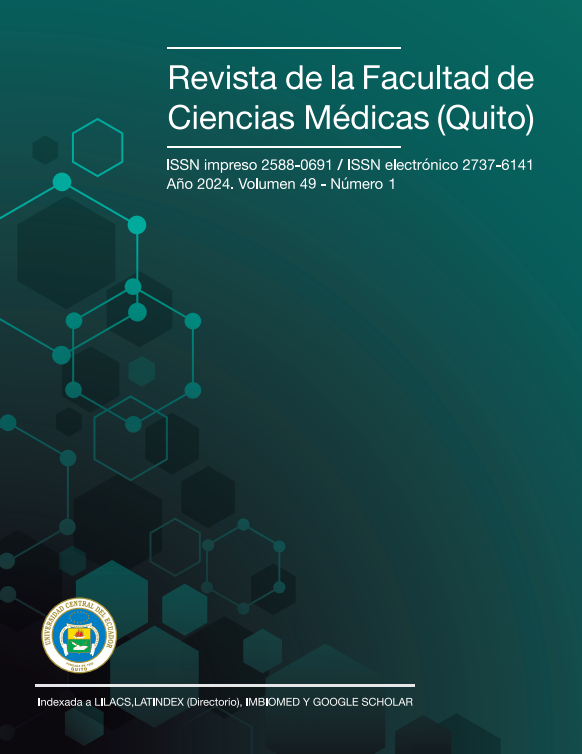Biliary panlitiasis in a 60-year-old male patient who underwent a bilioenteric anastomosis and cholecystectomy 13 years ago. Case report
DOI:
https://doi.org/10.29166/rfcmq.v49i1.5874Keywords:
bile ducts, choledocholithiasis, anastomosis, roux-en-YAbstract
Introduction: Panlithiasis is define as the presence of multiple stones in the biliary tract that is classified as primary, secondary, or mixed according to the origin of the stones. Management consists of endoscopic retrograde cholangiopancreatography (ERCP), exploration of the biliary tract, or biliodigestive anastomosis (BDA), either choledochoduodenostomy or hepaticojejunostomy.
Objective: Describe the clinical case of a patient with biliary panlithiasis, addressing the clinical presentation, diagnostic methods, treatment and evolution, with the purpose of offering a solid resource to the medical community.
Case Presentation: We present a 60-year-old male patient who underwent cholecystectomy 13 years ago and has a bilioenteric anastomosis with recurrent panlithiasis. Biliary lavage was performed with the output of stones and pus from the inside. Finally, a Kehr tube was placed along with clinical treatment. The patient showed a favorable outcome.
Discussion: This case revealed a panlithiasis upon exploration of the biliary tract under endoscopic vision. Despite finding no obstruction, the patient had a history of cholecystectomy and a hepatic-jejunal diversion due to iatrogenic injury. The treatment decision should be multidisciplinary, as each case is unique and depends on the patient's characteristics and individual clinical conditions.
Conclusions: Recurrent choledocholithiasis required strict pharmacological control to prevent recurrence and subsequent exploration of the biliary tract, which increases patient morbidity and mortality. Continuous medical follow-up of the patient and the predisposition with which they have for the formation of stones is important. These can be prevented, identified, and treated in a timely manner.
Downloads
Metrics
References
Gómez R, Pilatuña E. Utilidad de la gammaglutamil transpeptidasa como factor predictor temprano de coledocolitiasis en el Hospital Enrique Garcés. Revista de la Facultad de Ciencias Médicas UCE [Internet]. 2012 [Cited Dec 3, 2023];2(3):43. Available from: https://www.dspace.uce.edu.ec/entities/publication/d742f51d-1363-4b86-9af8-729c2a9f7dd0
Ruiz Pardo J, García Marín A, Ruescas García FJ, Jurado Román M, Scortechini M, Sagredo Rupérez MP, et al. Diferencias entre coledocolitiasis residual y primaria en pacientes colecistectomizados. Revista Española de Enfermedades Digestivas [Internet]. 2020 [Cited Dec 3, 2023];112(8):615–9. Available from: https://medes.com/publication/154140
Tomoda T, Kato H, Miyamoto K, Matsumi A, Ueta E, Fujii Y, et al. Outcomes of endoscopic treatment for malignant biliary obstruction in patients with surgically altered anatomy: analysis of risk factors for clinical failure. Surg Endosc [Internet]. 2021 [Cited Dec 3, 2023];35(1):232–8. Available from: https://link.springer.com/article/10.1007/s00464-020-07385-y
Houghton E, Buccini PA. Panlitiasis coledociana: ¿es la derivación biliodigestiva todavía una opción?. Acta Gastroenterol Latin [Internet]. 2018 [Cited Dec 3, 2023]; 48(1) 07–12. Available from: https://www.redalyc.org/journal/1993/199355697019/
Houghton EJ, Rubio JS, Palermo M. Manejo mini-invasivo de la litiasis coledociana. Prensa méd argent [Internet]. 2018 [Cited Dec 3, 2023];79–92. Available from: https://prensamedica.com.ar/LPMA_V104_N02_comp.pdf
Abellán G, Bajo L, Cabrera M, Fernández O. Tratado de geriatría para residentes. 1st ed. Madrid, España; International Marketing & Communication, S.A; 2006. Charper. Neurología. 467-519 p.
Lechaux JP LD. EMC - Técnicas Quirúrgicas - Aparato Digestivo. Anastomosis biliodigestivas en la litiasis biliar - EM consulte.2008 [Cited Dec 3, 2023]. p. 1–9. Available from: https://www.em-consulte.com/es/article/86875/anastomosis-biliodigestivas-en-la-litiasis-biliar
Winslow ER, Fialkowski EA, Linehan DC, Hawkins WG, Picus DD, Strasberg SM. “Sideways”: results of repair of biliary injuries using a policy of side-to-side hepatico-jejunostomy. Ann Surg [Internet]. 2009 [Cited Dec 3, 2023];249(3):426–34. Available from: https://pubmed.ncbi.nlm.nih.gov/19247030/
Booij KAC, Coelen RJ, de Reuver PR, Besselink MG, van Delden OM, Rauws EA, et al. Long-term follow-up and risk factors for strictures after hepaticojejunostomy for bile duct injury: An analysis of surgical and percutaneous treatment in a tertiary center. Surgery [Internet]. 2018 [Cited Dec 3, 2023];163(5):1121–7. Available from: https://pubmed.ncbi.nlm.nih.gov/29475612/
AbdelRafee A, El-Shobari M, Askar W, Sultan AM, El Nakeeb A. Long-term follow-up of 120 patients after hepaticojejunostomy for treatment of post-cholecystectomy bile duct injuries: A retrospective cohort study. International Journal of Surgery. [Internet]. 2015 1; 18:205–10. Available from: https:/ doi: 10.1016/j.ijsu.2015.05.004. Epub 2015 May 9. PMID: 25965917
Hosmer A, Abdelfatah MM, Law R, Baron TH. Endoscopic ultrasound-guided hepaticogastrostomy and antegrade clearance of biliary lithiasis in patients with surgically-altered anatomy. Endosc Int Open [Internet]. 2018 [Cited Dec 29, 2023];6(2):E127. Available from: /pmc/articles/PMC5794438/
Gianpiero A, Paspatis G, Aabakken L, Anderloni A, Arvanitakis M, Ah-Soune P, et al. Endoscopic management of common bile duct stones: European Society of Gastrointestinal Endoscopy (ESGE) guideline. Endoscopy [Internet]. 2019 [Cited Jan 1, 2024];51:472–91. Available from: https://doi.org/10.1055/a-0862-0346
Downloads
Published
How to Cite
Issue
Section
License
Copyright (c) 2024 Francisco Rivadeneira, Macarena Buitrón Heredia, Melissa Sarzosa, Joseph Mesías Logroño, Kathy Rivadeneira

This work is licensed under a Creative Commons Attribution-NonCommercial-NoDerivatives 4.0 International License.











